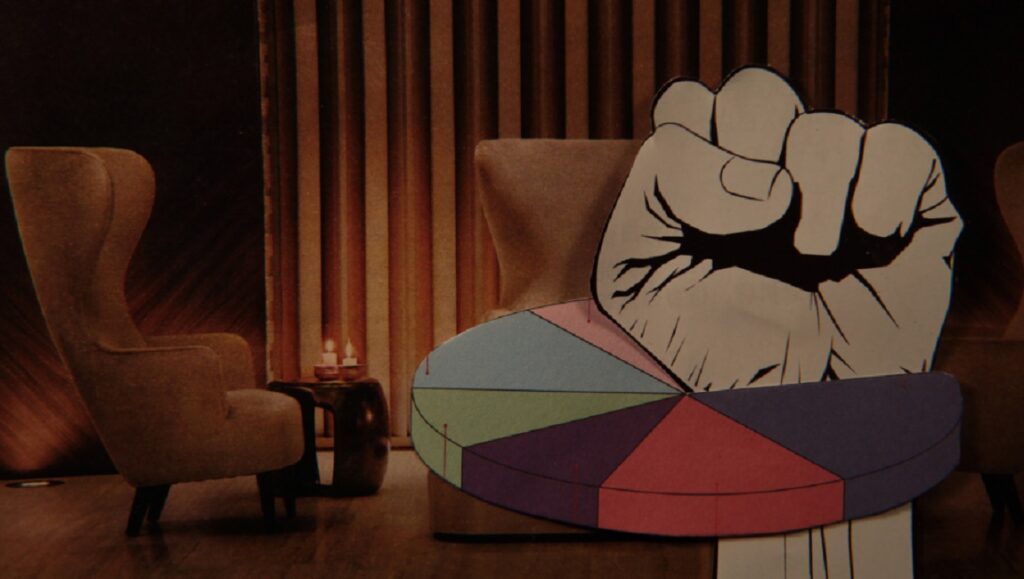Lewis Klahr’s latest example of collage cinema is his most explicitly political, and perhaps creative, yet.
Over several decades of consistent output, collage artist Lewis Klahr has been recontextualizing the past to make sense of the present. A student of avant-garde titan Paul Sharits, Klahr has produced work decidedly less grandiose than that of his teacher — or of his contemporaries such as Stan Brakhage, Hollis Frampton, and Ken Jacobs — choosing instead to work in a mode that film scholar Tom Gunning designated as a “minor cinema.” This designation wasn’t meant qualitatively, to say that these works were not in some sense “major” (other notable experimental makers who were lumped in this category includes both the late Mark LaPore and Phil Solomon). But the term suggested that these artists were less concerned about making big statements about the state of the cinematic image — Sharits notably claimed all narrative cinema was on the level of filmed theatre — and more interested in “prob[ing] the hieroglyphics of imagery rather than the depths of self.” The images Klahr has employed over the years have been taken from a variety of outdated print sources: shopping catalogs, weekly comic serials, picture books, and even some from his own personal collection. His photomontages exist at the intersection of free association and loose fiction; narrative is often suggested, but never strictly enforced. A sense of longing underscores the vast majority of his output, though its underlying melancholy and alienation has shifted over several periods of personal and artistic growth. Klahr has transitioned from shooting with 16mm analog film to now strictly using digital, which has allowed him further creative control and a greater economic freedom. Working mainly out of his garage, where he hoards stacks of magazines that may one day be incorporated into a new short, he is able to rapidly produce works for a fraction of his usual budge.
While most artists with his level of prestige would be comfortable playing it safe — he’s been chugging along at a steady rate for some time now — Klahr has decided to further challenge himself in each of his most recent undertakings. His latest, Circumstantial Pleasures, is no exception: it’s quite possibly the most radical, abrasive, and explicitly political work he’s crafted yet. Utilizing charged contemporary iconography (including images of Hillary Clinton, Donald Trump, and Mevlüt Mert Altıntaş, the Turkish police officer who assassinated Andrei Karlov), Klahr crafts an incensed mosaic for our precarious times, one that scrutinizes the failures of late-capitalism and rapid globalization with an expressly exasperated tone. There are no simple answers provided for the world’s ills, and no easy solutions either; instead, as in all of Klahr’s previous outings, we’re provided with an emotional dissonance that’s pushed to its most extreme ends. As the film is composed of six episodes, which each build in intensity, it’s easy to be lost in the (completely justified) anger found in each individual segment. But as a whole, this represents something of a creative breakthrough: the endeavor of a master who’s refined his craft to its most affective forms, while still engaging with newer technologies and techniques in the process. Juul pods are thrown in, serene live-action footage serves as a breather from the onslaught of harsh noise provided by composers David Rosenboom and Tom Recchion, and right when things seem to be winding down, the final stretch is set to Scott Walker’s deranged 20-minute long “Zercon, A Flagpole Sitter” before plunging into a hopeless twilight (“What if I freeze?/And drop into the darkness?”). Considering the state of the world as it currently stands, the failures of capitalism more exposed than ever before, there could hardly be more fitting a conclusion — a natural endpoint for the film’s various movements, and a kind of coda for the world at large. And with that, a relatively “minor” artist has produced possibly his most major work yet.
Published as part of June 2020’s Before We Vanish.


Comments are closed.